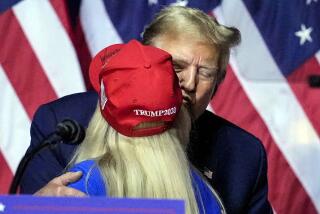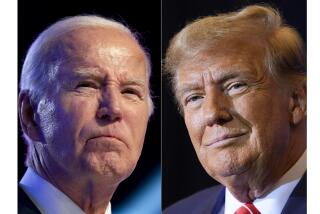Mitt Romney finds the game has changed
By just about every measure, Mitt Romney has done what it takes to nail down the GOP presidential nomination.
He has outraised his opponents, built a superior campaign organization, performed well in virtually every debate and secured the support of much of the Republican Party establishment. He has won handily in the two most important contests: the opening primary in New Hampshire and the costly and contentious race in Florida.
He has even run for president before, like most of those who have won the Republican nomination over the past half a century.
Yet this weekend finds the former Massachusetts governor with his shoulders pinned to the wall, still struggling for momentum, still struggling to assert himself as the GOP’s national front-runner. The reasons are several.
Some have to do with Romney. With a Republican electorate eager to clobber President Obama and seeking a nominee to embrace with all their heart, he has persistently failed to generate enthusiasm, much less affection.
Some reasons are structural, reflecting changes in the campaign finance laws, the election calendar and party rules for awarding convention delegates. All have allowed losing candidates to hang in much longer than in the past and provided incentive to do so.
The upshot is the most volatile and unpredictable GOP nominating fight in at least three decades. If there is a rule book governing the Republican selection process — which guided, among others, Ronald Reagan and both George Bushes — this campaign has shredded it.
“Normally A happens, B happens, and C happens,” said Stuart Stevens, a top Romney strategist. “We’re just in a different world, and I don’t think any of us really can grasp what that means, because we’re going through it for the first time.”
Not surprisingly, the Romney camp points to outside factors as the reason for the prolonged nominating fight, starting with the emergence of so-called “super PACs.”
These nominally independent and newly empowered campaign finance committees can raise and spend unlimited sums in support of a candidate, so long as there is no direct coordination with the candidate’s staff. The impact can be seen most obviously in the presence of Newt Gingrich and Rick Santorum, the latter posing the biggest threat to Romney in Tuesday’s primaries.
In the past, poor showings like Gingrich’s fourth-place finish in Iowa and distant second in Florida, or Santorum’s fifth-place performance in New Hampshire and poor third in Florida, would have dried up their resources and forced them out.
“Campaigns never die because candidates or campaigns want to die,” Stevens noted. “They die because they run out of money.”
But the super PACs backing Santorum and Gingrich each have been kept alive by a lone financial angel: The former Pennsylvania senator’s has received at least $1 million in help from mutual fund magnate Foster Friess. The former House speaker has benefited from at least $11 million in super PAC contributions from Las Vegas casino billionaire Sheldon Adelson and his family.
Also boosting Romney’s rivals are the calendar changes, which extended the time between contests. In the past, elections were so closely bunched that there was a chain reaction, with victory in one state propelling the winner to rapid success in several others.
By this time in 2008, more than half the states had voted, compared with just nine this year. The spacing between contests has dampened Romney’s momentum and given losers an opportunity to regroup. The result: Romney has been denied the big bounce that used to come with early victories.
After his dismal performances in New Hampshire and Florida, Santorum was able to bound back with victories Feb. 7 in Missouri, Minnesota and Colorado. A two-week break since then has given the former senator and his allies a chance to replenish his meager campaign chest, broadcast TV ads and bolster turnout operations in Michigan and Arizona, where the richly funded Romney had a considerable head start.
The change in party rules that is giving the also-ran candidates incentive to stay in the race were put in place to do just that. Several states, including California, have gone from awarding delegates on a winner-take-all basis to dividing them proportionally. Thus a candidate can win delegates even if they place second or worse; by accumulating a sufficient number, they can have much greater sway at this summer’s GOP nominating convention, something that Texas Rep. Ron Paul and, lately, Gingrich have been eyeing as they seek to cherry-pick delegates in selected areas.
The next test will come Tuesday in primaries in Michigan, where Romney was born and raised, and a sterner-than-expected race here in Arizona, where he once seemed a lock.
Even though Romney seems to have rebounded some in recent days, many say he has only himself to blame for his failure to pull away, especially given the weak field.
His shifting positions, most prominently on abortion, make social conservatives dubious. A series of clumsy statements — about fearing pink slips, enjoying firing people and, Friday, about his wife’s two Cadillacs — have estranged him from lower-income and working-class voters, who are among the most sought-after this year. Separately, his Mormon faith may be hurting him among evangelical voters.
“They’ve done everything by the textbook and he looks like a textbook candidate,” said Republican strategist Fred Davis, who worked for former Utah Gov. Jon Huntsman Jr. before Huntsman quit the race and endorsed Romney. “The flaw seems to be the candidate. People just aren’t comfortable with him.”
Strategists for Romney insist that will change, saying that even Reagan was not celebrated as a candidate the way he is today as a beloved former president. Winning does, in fact, confer glory and stature.
But even if Romney were to sweep Michigan and Arizona and wins big in the multiple contests March 6 — which is no sure thing — he would have to await his reward. The calendar and mathematics ensure that no candidate will secure the 1,144 delegates needed to clinch the nomination until mid-April at the earliest.
Then would come the general election, made all the more difficult by a bruising Republican fight that scuffed up the GOP front-runner and drained his once-flush campaign account.
Times staff writer Maeve Reston contributed to this report.
More to Read
Start your day right
Sign up for Essential California for news, features and recommendations from the L.A. Times and beyond in your inbox six days a week.
You may occasionally receive promotional content from the Los Angeles Times.







